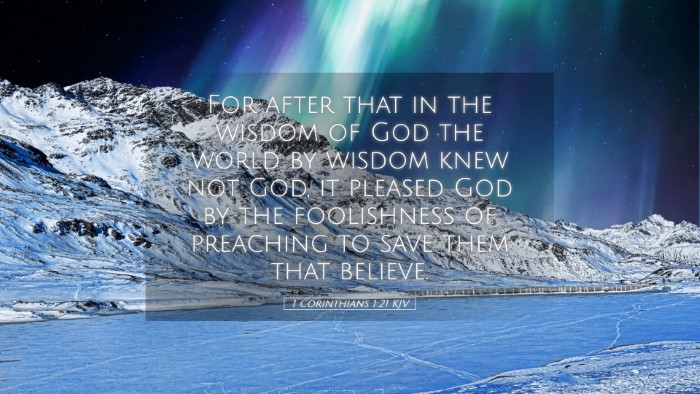Commentary on 1 Corinthians 1:21
Bible Verse: "For after that in the wisdom of God the world by wisdom knew not God, it pleased God by the foolishness of preaching to save them that believe."
Introduction
This verse from 1 Corinthians serves as a profound reminder of the contrast between divine wisdom and human understanding. In this passage, the Apostle Paul articulates a central tenet of the Christian message: while human wisdom fails to recognize God, divine wisdom reveals itself through the seemingly foolish act of preaching. This commentary synthesizes insights from Matthew Henry, Albert Barnes, and Adam Clarke, offering a comprehensive exploration of Paul's message.
Contextual Analysis
To grasp the depths of 1 Corinthians 1:21, one must consider the surrounding context. Paul writes to a church grappling with divisions, pride, and a misunderstanding of the true nature of wisdom and power. The backdrop of Greco-Roman philosophy emphasizes human intellect, often at odds with the gospel message.
Divine Wisdom Versus Human Wisdom
Henry points out that the "wisdom of God" contrasts sharply with the world’s wisdom. The latter, though rife with knowledge and insight, ultimately fails to recognize the Creator. As Barnes elaborates, the wisdom of men, in its pursuit of knowledge, often leads to the neglect of the spiritual truths that God reveals through the gospel.
- The Limitations of Human Wisdom: The world, in its cleverness, remains blind to the truth of God (Henry).
- Divine Revelation: God’s wisdom is revealed not through the elite or the wise of this world but through what appears foolish to men (Clark).
The “Foolishness of Preaching”
Here, Paul introduces a central paradox of the Christian faith: the "foolishness of preaching." To the worldly mind, the message of the cross and the act of preaching it seem irrational. However, this foolishness is the very means by which God has chosen to bring salvation to believers.
- The Power of God: This foolishness is described as a powerful instrument in the hands of God (Barnes).
- Faith’s Role: It is through faith, not intellect, that salvation is apprehended (Clarke).
The Purpose of God
God takes pleasure in using what seems weak and foolish to confound the wise (Henry). This not only reflects God's sovereignty but also His desire for humility among His followers.
- God's Intent: The divine choice of preaching as a means to save highlights God's purpose in establishing a relationship with humanity (Barnes).
- Encouragement for Believers: Believers are encouraged to embrace the gospel message, recognizing its divine authority and efficacy (Clarke).
Theological Implications
This verse raises several significant theological implications regarding the nature of God, the gospel, and human response:
- The Nature of God: God’s wisdom operates above human understanding, revealing His purposes in seemingly foolish ways (Henry).
- Human Response: The necessity for a faithful response to the preached word—believers are called to trust in the message, not to dismiss it as foolishness (Barnes).
- The Role of the Church: The church is commissioned to preach this message of the cross, embodying the paradox of strength made perfect in weakness (Clarke).
Practical Applications
As pastors, students, and theologians engage with this passage, several practical applications emerge:
- Embrace Humility: Acknowledge the limitations of human wisdom in understanding divine truths.
- Preach the Cross: Commitment to proclaim the gospel faithfully, regardless of worldly perceptions of its wisdom.
- Encourage Faith: Foster an environment in which faith is prioritized over intellectual reasoning in the pursuit of understanding God.
Conclusion
In 1 Corinthians 1:21, Paul invites believers to reconsider the nature of wisdom and power. The Christian message, viewed as foolishness, is God's chosen means of salvation. By recognizing the limitations of human wisdom and embracing the gospel of Christ, understanding deepens, drawing believers closer to the heart of God. As we navigate challenges in contemporary society, let us hold fast to the wisdom of God revealed in the gospel, preaching it with confidence and conviction.


